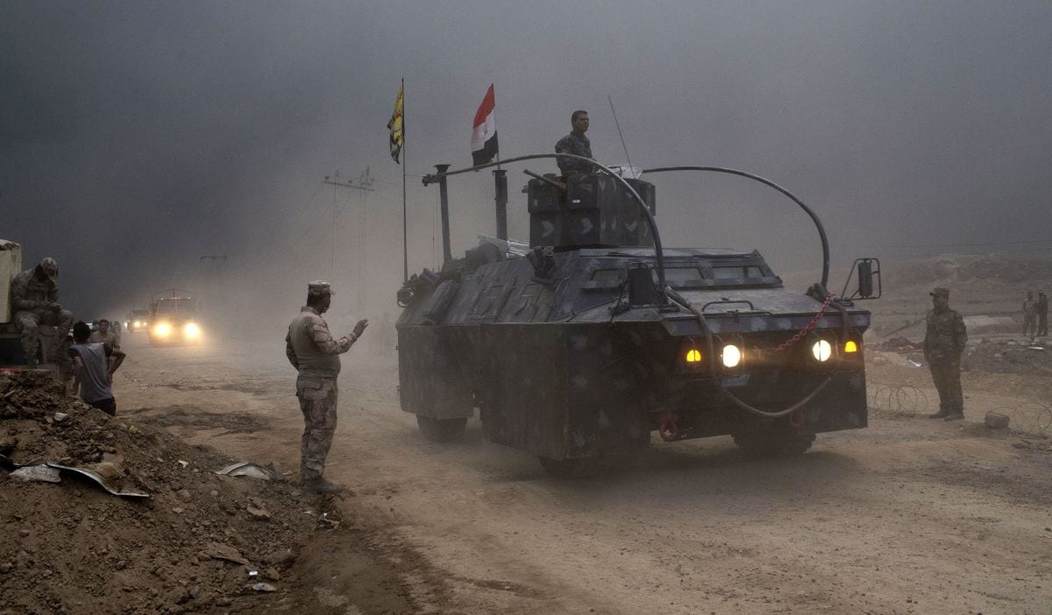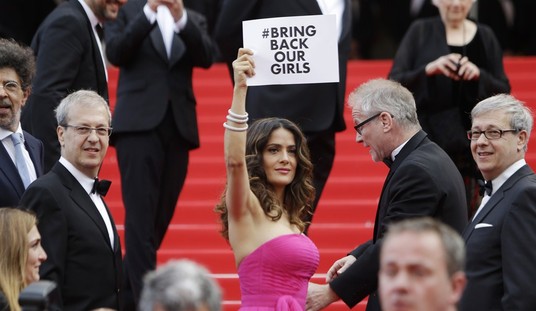A dispatch from the front lines of the battle for Mosul reveals a hellish existence for those unfortunate enough not to have already fled.
The Islamic State knows it is doomed to lose their last remaining urban center in Iraq. As a result, the terror group has taken brutality to a whole new level. They figure since they are not going to inherit the land, they will sow it with salt.
And that includes lighting dozens of oil fires that have been burning for months.
Through the gloom, civilians fleeing the fighting walk toward Qayyarah, a town 40 miles south of Mosul notable for its oil fields and an air base now used by the international coalition to bombard Islamic State positions. Mothers carry coughing infants; fathers walk arm in arm with small children. Most are grubby, tired, and empty-handed, save a few plastic grocery bags full of personal items.
“Hell,” his younger brother says. “We’ve come from hell to this.”
As the Iraqi Army advances toward Mosul, the Islamic State’s largest remaining urban population center, a trickle of displaced Iraqis is turning into a flow that could soon be an unmanageable flood. In the first 10 days of the military operation to retake Mosul, more than 10,000 civilians have been displaced by the fighting.
With the potential loss of Mosul looming, fleeing Iraqis tell of an increasingly brutal, paranoid, and vengeful rule by the Islamic State. Murder of civilians has become routine; those trying to escape the Islamic State’s grasp, those suspected of informing against the group, and those who were simply once a member of the army or police have all been targeted, several fleeing Iraqis say.
“I was whipped with chains for two-and-a-half days,” says Rayan Asal Khidayer, showing the scars on his legs. “They said I was helping the army.”
ISIS is setting the fires in a primitive effort to obscure the view of pilots who bomb them. Most U.S. aircraft are equipped with technology that can penetrate the gloom and pinpoint where the enemy is.
But there is a genuine fear among Iraqi army attackers that before it’s over, the Islamic State will unleash a chemical attack on the troops.
The major concern of the Iraqi government is that ISIS fighters will mix in with fleeing refugees and escape Mosul to fight another day:
Although the Islamic State is being driven back militarily, Iraqi security forces are concerned that its supporters will join fleeing civilians and infiltrate behind the lines. But Wisem says they are victims of the Islamic State, not supporters. After two of his brothers fled their village of Mounireh, which lies midway between Mosul and Qayyarah, he and his remaining brothers faced repeated detention and torture by Islamic State fighters as punishment. “It was miserable and pitiful,” he says.
The Islamic State is dependent on the presence of civilians to legitimize its claim to have established a caliphate that represents all Muslims. As it comes under increasing pressure, the group has become desperate to retain control of its civilian population.
Waiting nearby to pass the checkpoint, Mahmoud Ahmed Ussein tells a similar story. “Daesh told us that there would be fighting in our village and they would take us to the town of Hamam to protect us,” he says, using the Arabic acronym for the Islamic State, also known as ISIS. “This was a lie: They want to use us as human shields there so the army won’t attack them.”
His village, Mohandes Gharbi, was liberated a week earlier by soldiers of the Iraqi Army’s 15th Division, who told the residents to remain in their homes, but Ussein says they desperately need humanitarian assistance. “There was no food under ISIS; they only gave to those who pledged allegiance,” he says.
After his 17-year-old son had a seizure, Ussein walked 12 miles to find medication for him. “There is nothing now in our village, no supplies,” he says. “ISIS destroyed us, and now they’re desperate.”
The battle appears to be going reasonably well, although the Iraqi government believes the advance is too slow. Shia militias, sanctioned by the government, have joined the battle now, attacking the strategic hamlet of Tal Afar. Soon, the overwhelming superiority in numbers possessed by the government will succeed in kicking ISIS out of Mosul.
But that will only begin what is sure to be a rancorous process of trying to put a country back together that suffers from so many divisions. Most observers believe that challenge is fraught with far more danger than the military challenge facing the government in Mosul.










Join the conversation as a VIP Member